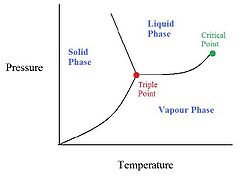Phase Diagrams
The phase of a material substantially affects its behaviour, thus its chemistry. Understanding phases and the conditions in which they occur are important in understanding the thermodynamic aspects of physical chemistry.
In thermodynamics, the phase of a substance at equilibrium can be described using a phase diagram. In Chemistry 123, we need only be concerned with the phase diagrams of one-component systems.
Let's begin with H2O, which has three phases: gas, liquid, solid. From the diagram on the left, we see that the plot of what phase water would be in at a certain pressure and temperature. As temperature increases, the phase moves from solid to liquid to vapour (unless the pressure is very low,
A features of a phase diagram:
- Triple point is a certain temperature and pressure where
- Critical point is when you have a few or more solution that

Multiphase diagrams
Other phase diagrams that are relevant in this course are the diagrams of sulphur, and